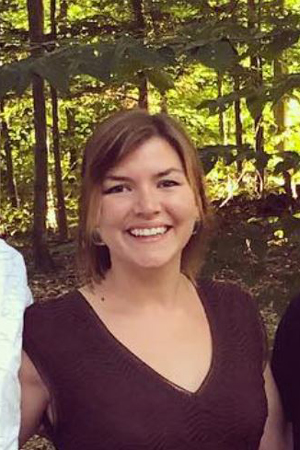
Melina Luethje, Ph.D.
- Instructor
- DSC 265
- Paleolimnology, paleoclimate, micropaleontology
Additional Information
Education
B.S. Geology – Marietta College, OH
M.S. Geology – Bowling Green State University, OH
Ph.D. Geology – University of Nebraska-Lincoln
Courses Taught
GEOL 1170 – Physical GeologyGEOL 2500 – Geology of Nebraska
GEOL 2750 – Mineralogy
GEOL 4600 – Paleoclimate
GEOL 4600 – Paleolimnology
Research Interests
I am an interdisciplinary geoscientist interested in understanding lake dynamics on varying spatial and temporal scales. In other words, I am a paleolimnologist, or someone who studies past lakes. To do this, I use diatoms, a type of photosynthetic algae with glass shells, to reconstruct past lake environments. Changes in lake environments through time can be caused by regional factors (e.g., climate) or local factors (e.g., human land-use). My research aims to tease apart what caused past changes in lake environments to provide insight into modern and future lake environmental shifts.- Andean paleolimnology
- Amazonian paleolimnology
- Diatom ecology and paleoecology
- Nebraska lake water quality
Recent Publications
Luethje M, Benito X, Schneider T, Mosquera PV, Baker PA, Fritz SC (accepted in press) Paleolimnological response of Ecuadorian páramo lakes to local and regional stressors over the last two millennia. Journal of Paleolimnology.
Benito, X., Luethje, M., Schneider, T., Fritz, S.C., Baker, P.A., Pedersen, E.J., Gaüzére, P., de Novaes Nascimento, M., Bush, M., Ruhi, A. (2021) Ecological resilience in tropical Andean lakes: a paleolimnological perspective. Limnology and Oceanography
Luethje M, Snyder J (2020) Morphological analysis of Pantocsekiella (Lindavia) valves (Bacillariophyceae) from the ancient Lake El’gygytgyn, northeastern Russia. Phytotaxa.
Benito X, Vilmi A, Luethje M, Carrevedo ML, Lindholm M, Fritz SC (2020) Spatial and temporal ecological uniqueness of Andean diatom communities are correlated with climate, geodiversity and long-term limnological change. Frontiers in Ecology and Evolution.
Benito X, Feitl M, Fritz SC, Mosquera PV, Schneider T, Hampel H, Quevedo L, Steinitz-Kannan M (2019) Identifying temporal and spatial patterns of diatom community change in the tropical Andes over the last c. 150 years. Journal of Biogeography.
Feitl M, Kern AK, Jones A, Fritz SC, Baker PA, Joeckel RM, Salenbien W, Willard D (2019) Paleoclimate of the subtropical Andes during the latest Miocene, Lauca Basin, Chile. Palaeogeography, Palaeoclimatology, Palaeoecology.
de Wett CB, de Wett AP, Driscoll E, Patzkowski S, Xu C, Gigliotti S, Feitl M (2019) Pliocene short-term climate changes preserved in continental shallow lacustrine-palustrine carbonates: Western Opache Formation, Atacama Desert, Chile. Geological Society of America Bulletin.
Additional Information
Education
B.S. Geology – Marietta College, OH
M.S. Geology – Bowling Green State University, OH
Ph.D. Geology – University of Nebraska-Lincoln
Courses Taught
GEOL 1170 – Physical GeologyGEOL 2500 – Geology of Nebraska
GEOL 2750 – Mineralogy
GEOL 4600 – Paleoclimate
GEOL 4600 – Paleolimnology
Research Interests
I am an interdisciplinary geoscientist interested in understanding lake dynamics on varying spatial and temporal scales. In other words, I am a paleolimnologist, or someone who studies past lakes. To do this, I use diatoms, a type of photosynthetic algae with glass shells, to reconstruct past lake environments. Changes in lake environments through time can be caused by regional factors (e.g., climate) or local factors (e.g., human land-use). My research aims to tease apart what caused past changes in lake environments to provide insight into modern and future lake environmental shifts.- Andean paleolimnology
- Amazonian paleolimnology
- Diatom ecology and paleoecology
- Nebraska lake water quality
Recent Publications
Luethje M, Benito X, Schneider T, Mosquera PV, Baker PA, Fritz SC (accepted in press) Paleolimnological response of Ecuadorian páramo lakes to local and regional stressors over the last two millennia. Journal of Paleolimnology.
Benito, X., Luethje, M., Schneider, T., Fritz, S.C., Baker, P.A., Pedersen, E.J., Gaüzére, P., de Novaes Nascimento, M., Bush, M., Ruhi, A. (2021) Ecological resilience in tropical Andean lakes: a paleolimnological perspective. Limnology and Oceanography
Luethje M, Snyder J (2020) Morphological analysis of Pantocsekiella (Lindavia) valves (Bacillariophyceae) from the ancient Lake El’gygytgyn, northeastern Russia. Phytotaxa.
Benito X, Vilmi A, Luethje M, Carrevedo ML, Lindholm M, Fritz SC (2020) Spatial and temporal ecological uniqueness of Andean diatom communities are correlated with climate, geodiversity and long-term limnological change. Frontiers in Ecology and Evolution.
Benito X, Feitl M, Fritz SC, Mosquera PV, Schneider T, Hampel H, Quevedo L, Steinitz-Kannan M (2019) Identifying temporal and spatial patterns of diatom community change in the tropical Andes over the last c. 150 years. Journal of Biogeography.
Feitl M, Kern AK, Jones A, Fritz SC, Baker PA, Joeckel RM, Salenbien W, Willard D (2019) Paleoclimate of the subtropical Andes during the latest Miocene, Lauca Basin, Chile. Palaeogeography, Palaeoclimatology, Palaeoecology.
de Wett CB, de Wett AP, Driscoll E, Patzkowski S, Xu C, Gigliotti S, Feitl M (2019) Pliocene short-term climate changes preserved in continental shallow lacustrine-palustrine carbonates: Western Opache Formation, Atacama Desert, Chile. Geological Society of America Bulletin.